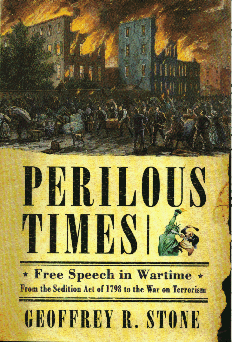Stifling criticism is no way to fight a war.

By Dennis Drabelle | Once started, a war is the ace of trumps. Badmouth the cause, and you’re putting national security at risk, encouraging the enemy, and undercutting your own forces. Or so, at least, public officials have asserted from the beginning of the republic until the day before yesterday. To back up their words, they have enacted bad laws, signed oppressive executive orders, and given judicial approval to panicky actions—for all of which Geoffrey Stone, the Harry Kalvern, Jr. Distinguished Service Professor of Law at the University of Chicago and a leading authority on the First Amendment, calls them to account. In Perilous Times, his magnificent study of six episodes in American history, Stone suggests that free speech is not less important in wartime, as many presidents and attorneys general and judges have assumed, but more so.
Some of Stone’s episodes are fairly recent and well-known: the internment of Japanese Americans during World War II; the persecutions of the McCarthy years; the Nixon administration’s intimidation of dissenters; the draconian Patriot Act passed in the wake of September 11. Others will be less familiar to many readers: the disgusting trials pursuant to the Sedition Act of 1798; the highhanded treatment of peacenik Congressman Clement Vallandigham during the Civil War; the intolerance of anti-war dissent shown by, of all people, former university president Woodrow Wilson as U.S. president during World War I. What all the episodes have in common is the urge to silence critics on the theory that the imminence or actuality of war somehow waters down the First Amendment.
Some of Stone’s dramatis personae sound truly scary. He quotes William Seward, Lincoln’s secretary of state, allegedly gloating to the British ambassador, “I can touch a bell on my right hand and order the arrest of a citizen in Ohio. I can touch the bell again and order the imprisonment of a citizen of New York, and no power on earth but that of the President can release them.” And some of the punishments that were inflicted defy belief. Under the Espionage Act of 1917, one Robert Goldstein was prosecuted for making a movie about the American Revolution that included a reenactment of the Wyoming Valley Massacre, “in which British soldiers bayoneted women and children. The government charged that this was an attempt to promote insubordination because it negatively portrayed America’s ally in the war against Germany.” A craven judge agreed, sentencing Goldstein to 10 years in prison.
But let’s put aside the extreme cases and concentrate on Stone’s central argument. Why shouldn’t the government stifle criticism of its decisions during “perilous times”? Why shouldn’t citizens be expected to make sacrifices, including the exercise of their rights, when the country’s future may be at stake? And doesn’t outgoing attorney general John Ashcroft have a point when he cites the danger that “intrusive judicial oversight and second-guessing of presidential determinations … can put at risk the very security of our nation in a time of war”?
For one thing, as Stone reminds us, the First Amendment came without a dimmer switch. If freedom of expression is a precondition for democratic government, it is all the more so when something crucial is the topic. Indeed, the very possibility that national security is on the line may enhance the value of challenging received opinion. Wars can be stopped or cut short, and if you think an ongoing one is wrongheaded, don’t you owe it to your country to try to change minds? As for the fretful Ashcroft, history is not on his side. “Although Congress and the president have often underprotected free speech in wartime,” Stone writes, “there is not a single instance in which the Supreme Court has overprotected wartime dissent in a way that caused any demonstrable harm to the national security. The argument that courts cannot be trusted because they will recklessly shackle the nation’s ability to fight is simply unfounded.”
To the contrary, citing a “natural tendency” for public officials to squelch ideas they find “offensive or misguided,” Stone regards the Supreme Court as a much-needed counterweight. Over the years the Court has decreed its share of follies, including Korematsu v. United States, in which even those stalwarts of individual liberty, Hugo Black and William O. Douglas, voted to uphold the Japanese internments. But overall Stone detects progress—lumbering but steady—in the Court’s free-speech decisions.
In the last half-century or so, Stone notes, we have also seen “the development of a national culture more attuned to civil liberties.” (It’s hard, for example, to imagine a return to the cowering conformity of the McCarthy era, when the Cincinnati Reds felt obliged to rename themselves the Redlegs.) Stone calls the broad beachhead of support for free speech “a testament to the strength of American democracy.”
Constitutional law can be knotty, but Stone is a helpful, jargon-avoiding explicator, as well as a fine storyteller. He lets those who would muzzle dissenters make their arguments, then patiently sets them straight. Perilous Times is thoughtful, engrossing, and impeccably well-timed.
Dennis Drabelle G’66 L’69 is a contributing editor of The Washington Post Book World.




